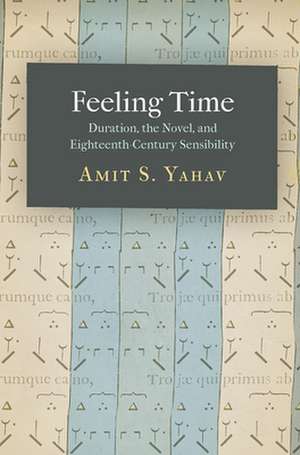Feeling Time – Duration, the Novel, and Eighteenth–Century Sensibility
Autor Amit S. Yahaven Limba Engleză Hardback – 7 mai 2018
In Feeling Time, Amit Yahav challenges this narrative of the triumph of chronometry and the consequent impoverishment of individual experience. She explores the fascination eighteenth-century writers had with the mental and affective processes through which human beings come not only to know that time has passed but also to feel the durations they inhabit. Yahav begins by elucidating discussions by Locke and Hume that examine how humans come to know time, noting how these philosophers often consider not only knowledge but also experience. She then turns to novels by Richardson, Sterne, and Radcliffe, attending to the material dimensions of literary language to show how novelists shape the temporal experience of readers through their formal choices. Along the way, she considers a wide range of eighteenth-century aesthetic and moral treatises, finding that these identify the subjective experience of duration as the crux of pleasure and judgment, described more as patterned durational activity than as static state.
Feeling Time highlights the temporal underpinnings of the eighteenth century's culture of sensibility, arguing that novelists have often drawn on the logic of musical compostion to make their writing an especially effective tool for exploring time and for shaping durational experience.
Preț: 433.78 lei
Nou
Puncte Express: 651
Preț estimativ în valută:
83.01€ • 86.35$ • 68.53£
83.01€ • 86.35$ • 68.53£
Carte tipărită la comandă
Livrare economică 14-28 aprilie
Preluare comenzi: 021 569.72.76
Specificații
ISBN-13: 9780812250176
ISBN-10: 0812250176
Pagini: 208
Dimensiuni: 161 x 238 x 22 mm
Greutate: 0.5 kg
Editura: MT – University of Pennsylvania Press
ISBN-10: 0812250176
Pagini: 208
Dimensiuni: 161 x 238 x 22 mm
Greutate: 0.5 kg
Editura: MT – University of Pennsylvania Press
Cuprins
Notă biografică
Amit S. Yahav
Descriere
Feeling Time highlights the temporal underpinnings of the eighteenth century's culture of sensibility, arguing that novelists have often drawn on logics of musical composition to make their writing an especially effective tool for exploring time and for shaping durational experience.
